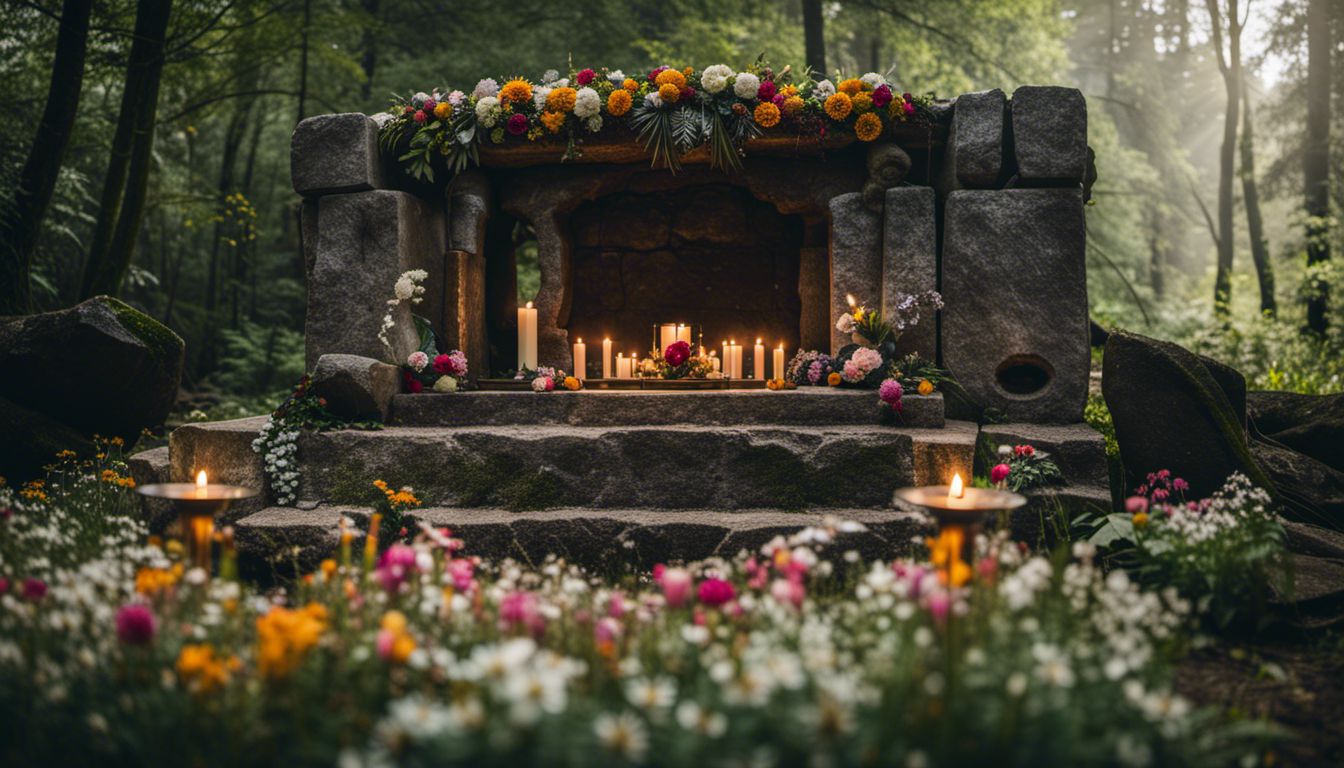Valentine’s Day— it’s often considered a commercial holiday devoted to love and romance. But did you know that this sweet occasion has deep roots steeped in spirituality? In this article, we delve into the spiritual significance of Valentine’s Day, sharing its historical context and exploring the profound meaning behind celebrating love.
Ready to discover a deeper side to your box of chocolates? Read on!
The Origins of Valentine’s Day
Saint Valentine’s Day is believed to have originated from the story of Saint Valentine, a Christian martyr who was executed for performing weddings for soldiers in ancient Rome.
The story of Saint Valentine

Saint Valentine, a martyr in Christian history, is the inspiration behind Valentine’s Day. Despite facing harsh and oppressive conditions, he continued to perform weddings for young couples in love.
His actions were against the orders of Roman Emperor Claudius II who had banned marriages for young men. The Emperor believed single men made better soldiers than those with wives and families.
Saint Valentine was eventually arrested and put to death on February 14th for defying these edicts. His staunch belief in the power of love symbolizes a commitment to affection and connection above societal constraints even today.
Historical roots of the holiday

Centuries ago, Valentine’s Day took root as a Christian feast day in honor of a martyr named Valentine. Ancient Rome’s mid-February celebrations held significance too, infused with fertility rites that included the unusual practice of men sacrificing a goat and dog while naked.
Over time, cultures and religions worldwide embraced this special season of love. The spiritual meaning shifted to reflect God’s gift to mankind and highlight the importance of true love, devotion, positivity, care, commitment, loyalty – all features embodying divine energy.
Fast-forward several centuries; folks celebrate it with festivities expressing love and unity among companionship and intimate relationships. However deep beneath these celebrations lies its historical roots reminding us not just about romance but also deeper values and connections.
The Spiritual Significance of Love

Love is not just an emotion, but a powerful divine energy that connects us to the spiritual realm and brings us closer to our true selves.
Love as a divine energy

Love, in its most profound form, carries an almost divine energy. This spiritual force radiates from the heart and soul, affecting not only our lives but also those around us. It goes beyond romantic relationships to encompass love for all beings and the universe itself.
The expression of this divine energy can heal wounds, foster unity and inspire acts of kindness and compassion. God’s love is often considered a prime example of such divine energy – unconditional, forgiving and enduring no matter what the circumstances are.
Harnessing love as a divine energy helps in spiritual growth by fostering empathy, understanding, appreciation, commitment and mutual respect among individuals. It teaches us to see the sacredness in others and treat them with dignity and care.
The power of unconditional love
Unconditional love is a force that knows no limits or boundaries. It is the purest and most powerful form of love, transcending all expectations and conditions. Unconditional love allows us to see beyond flaws and imperfections, embracing others for who they truly are without any judgment or reservation.
This type of love has the power to heal wounds, mend broken relationships, and bring about profound transformations in our lives. It reminds us that we are all interconnected and deserving of love and compassion, regardless of our past mistakes or shortcomings.
Unconditional love teaches us acceptance, forgiveness, and empathy towards ourselves and others, creating a ripple effect that spreads positivity and kindness throughout the world.
Love as a path to spiritual growth

Love is not only a powerful emotion but also a catalyst for spiritual growth. When we embrace love with an open heart, it has the potential to transform and elevate our souls. Love teaches us valuable lessons about compassion, forgiveness, and connection.
It inspires us to let go of ego-driven desires and cultivate selflessness. By practicing unconditional love in our relationships and interactions, we nourish our spirits and align ourselves with the divine energy that flows through all beings.
Love becomes more than just a feeling; it becomes a transformative force that guides us on our journey towards spiritual enlightenment.
How Valentine’s Day Evolved Over Time
Valentine’s Day evolved over time through its adoption by the Christian church, association with courtly love, and eventual commercialization into modern celebrations.
Adoption by the Christian church
The Christian church played a significant role in the adoption of Valentine’s Day. Originally, it was a Christian feast day honoring Saint Valentine, a martyr who sacrificed his life for love and faith.
Over time, the holiday gained recognition and popularity within the church community. Today, Valentine’s Day continues to hold spiritual significance as Christians embrace love, compassion, and devotion towards one another as expressions of their faith.
Romantic association with courtly love
 Courtly love is a concept that became popular during the Middle Ages and it became associated with Valentine’s Day over time. This romantic association emphasizes the idea of chivalry, devotion, and admiration between a knight and his lady.
Courtly love is a concept that became popular during the Middle Ages and it became associated with Valentine’s Day over time. This romantic association emphasizes the idea of chivalry, devotion, and admiration between a knight and his lady.
It involves expressing love through poetry, songs, and gestures of affection. Courtly love has contributed to the image of Valentine’s Day as a celebration of romance and passionate connections between individuals.
Commercialization and modern celebrations

Valentine’s Day has not only evolved over time but has also become heavily commercialized, with modern celebrations centering around material gifts and gestures. This commercialization has led to a shift in focus from the spiritual meaning of the day to the exchange of lavish presents and grand gestures. It is important to remember that the true essence of Valentine’s Day lies in expressing love, care, and appreciation towards our loved ones, rather than solely relying on materialistic displays.
- Marketed products: Companies take advantage of Valentine’s Day by promoting their products as symbols of love. From heart-shaped chocolates and flowers to extravagant jewelry and expensive dinners, these marketed products often overshadow the spiritual significance behind the day.
- Pressure to spend money: With advertisements bombarding our screens and stores filled with Valentine-themed merchandise, there is a societal pressure to spend excessive amounts of money on gifts. The focus shifts from meaningful gestures to monetary value.
- Social media culture: In today’s digital age, social media platforms play a significant role in shaping how we celebrate events like Valentine’s Day. There is an urge to showcase extravagant gifts or luxurious experiences online, leading to a sense of competition and comparison among individuals.
- Expectations for grand gestures: Commercialization perpetuates the idea that love should be expressed through grand gestures or expensive presents. This can create unnecessary pressure on individuals who might not have the financial means to meet these expectations.
- Time constraints: Modern lifestyles often leave little time for heartfelt expressions of love and connection. Many people resort to last-minute purchases or generic gifts due to busy schedules or lack of planning.
Incorporating the Spiritual Meaning of Valentine’s Day into Celebrations
Celebrate Valentine’s Day by performing acts of kindness, nurturing relationships, practicing forgiveness, and cultivating gratitude to deepen the spiritual meaning of this special day.
Read more for ideas on how to infuse love and devotion into your celebrations.
Acts of kindness and compassion
Acts of kindness and compassion are an important part of incorporating the spiritual meaning of Valentine’s Day into our celebrations. Here are some ways we can practice love and compassion on this special day:
- Reaching out to someone in need, such as donating food or clothing to a local charity.
- Sending a heartfelt message or card to a friend or family member, expressing gratitude and appreciation for their presence in our lives.
- Engaging in random acts of kindness, such as paying for someone’s meal or offering a helping hand to a stranger.
- Volunteering at a community organization or spending time with elderly individuals who may be feeling lonely.
- Taking the time to listen and offer support to someone going through a difficult time.
- Forgiving those who have hurt us, letting go of resentment, and choosing understanding and empathy instead.
- Showing compassion towards ourselves by practicing self – care and engaging in activities that bring us joy and peace.
Honoring and nurturing relationships

Valentine’s Day reminds us to honor and nurture our relationships. It is a time to reflect on the love and connections we have with others. On this special day, we can show our appreciation for those who are important to us. We can take the opportunity to celebrate and strengthen our bonds. By spending quality time together, sharing heartfelt words of love and affection, and making gestures of kindness, we can nourish the relationships that bring us joy and fulfillment. Let Valentine’s Day be a reminder to cherish and prioritize the special people in our lives.
Practicing forgiveness and letting go

Valentine’s Day also offers an opportunity to practice forgiveness and letting go. It is a time to release grudges and resentments, allowing love to prevail. By forgiving others and ourselves, we free our hearts from negativity and make space for love to flow. Letting go of past hurts allows us to grow and move forward with open hearts. It’s a chance to cultivate compassion, understanding, and healing in our relationships.
Cultivating gratitude and appreciation

Valentine’s Day is an opportunity to cultivate gratitude and appreciation in our lives. It reminds us to take a moment to reflect on the blessings we have and the people who bring love into our lives. It is a time to express our appreciation for the relationships that bring us joy and support. Cultivating gratitude and appreciation allows us to deepen our connections with others, fostering a sense of unity and compassion. This Valentine’s Day, let us show gratitude for the love we have and appreciate the precious moments we share with our loved ones.
Conclusion
In conclusion, Valentine’s Day holds a deeper spiritual meaning beyond just love and romance. It is an opportunity to reflect on the power of unconditional love, forgiveness, and gratitude.
By incorporating these spiritual values into our celebrations, we can truly honor the essence of this special day and cultivate a more meaningful connection with ourselves and others.
FAQs
1. What is the spiritual meaning of Valentine’s Day?
The spiritual meaning of Valentine’s Day varies depending on personal beliefs, but it is often seen as a day to celebrate love, compassion, and connection with others. Some may view it as an opportunity to deepen their relationships and express gratitude for the love they have in their lives.
2. Are there any religious or cultural associations with Valentine’s Day?
While Valentine’s Day does not have specific religious origins, it has become widely celebrated in many cultures around the world. In Christian tradition, Saint Valentine was a martyr who represented love and sacrificial actions. However, today the holiday extends beyond religious boundaries and is observed by people of various faiths and backgrounds.
3. How can I incorporate spirituality into my Valentine’s Day celebration?
Incorporating spirituality into your Valentine’s Day celebration can involve acts of kindness towards others, expressing gratitude for loved ones, reflecting on the deeper meanings of love and connection, or participating in rituals or prayers that align with your beliefs. It can also be a time for self-reflection and cultivating self-love.
4. Can celebrating Valentine’s Day have a positive impact on spirituality?
Yes! Celebrating Valentine’s Day can have a positive impact on spirituality by encouraging individuals to focus on love, compassion, and meaningful connections with others. It can serve as a reminder to prioritize nurturing relationships and spreading kindness in daily life – all aspects that are often associated with spiritual growth.
